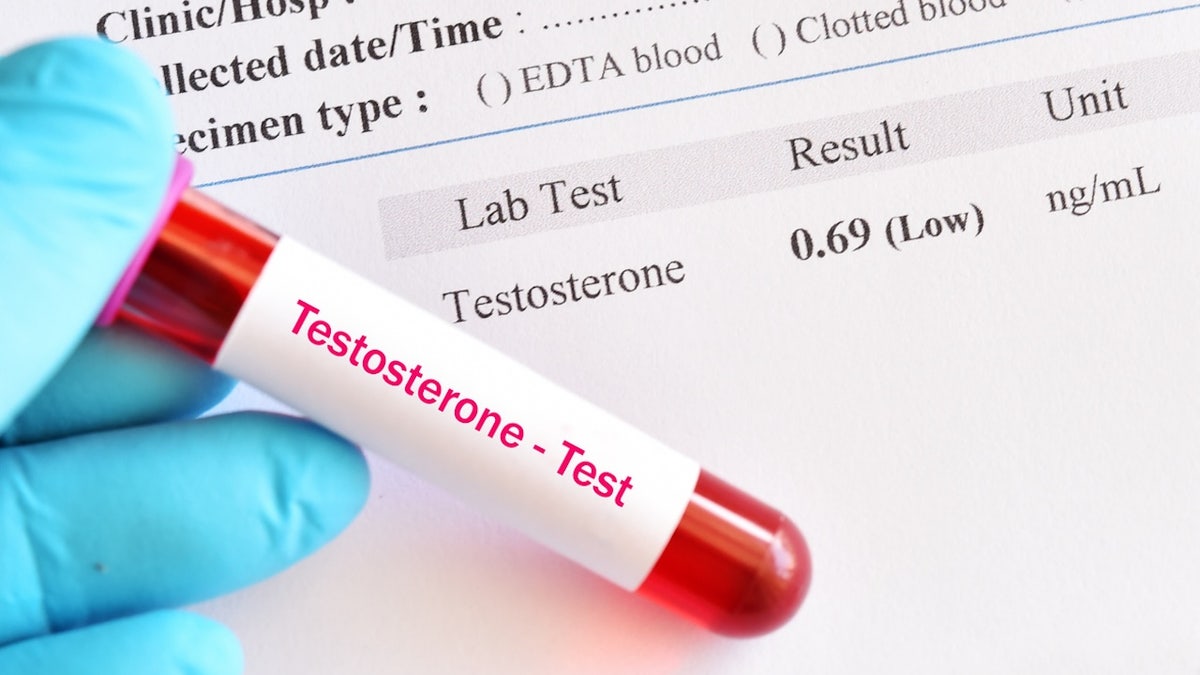Even if you’ve cultivated the perfect environment for sleeping, some invisible details may be interfering with a good night’s rest.
Certain biomarkers — also called biological markers or medical signs, according to the National Institutes of Health — can have a direct impact on sleep.
“Various factors can affect sleep,” said Dr. Brett Osborn, a Florida neurologist and longevity expert, in an interview with Fox News Digital. “Some of them, biomarkers, can be measured with simple laboratory tests.”
ALWAYS FEELING TIRED? EXPERTS SHARE 4 COMMON CAUSES OF DAYTIME FATIGUE
The values of these biomarkers are an indicator of an individual’s health and wellness.
Experts shared the six biomarkers that have the biggest effect on sleep — and tips on how to optimize them.
Certain biomarkers, also referred to as biological markers or medical signs, can have a direct impact on sleep. Experts identify the measurements. (iStock)
“What you can measure, you can optimize,” said Osborn.
“Optimizing these markers may improve not only your sleep quality, but also your overall health.”
Here are six.
Biomarker 1 – Vitamin D
Optimal vitamin D levels can improve sleep quality by helping you fall asleep faster and increasing the amount of time you spend asleep, according to Michelle Darian, a registered dietitian and science and product marketing manager at InsideTracker, a health platform that provides personalized nutrition and lifestyle recommendations.
“Low blood levels of vitamin D are associated with decreased sleep time, decreased sleep efficiency and increased daytime sleepiness,” Chicago-based Darian told Fox News Digital.
“Research notes that vitamin D is indirectly involved in the production of melatonin — a hormone that mediates the sleep cycle — and brain receptors responsible for sleep regulation.”
To optimize vitamin D levels, Darian said she recommends getting 20 minutes of sunlight a day and eating vitamin D-rich or fortified foods like fatty fish like salmon, tuna and mackerel or fortified dairy products.

To optimize vitamin D levels, Darian recommends getting 20 minutes of sunlight a day and eating vitamin D-rich or fortified foods. (iStock)
“This can help you meet your body’s daily needs and help you fall asleep faster to increase the time you spend asleep,” she said.
For those with vitamin D deficiency, a supplement may be needed to boost levels.
“Optimizing these markers may improve not only your sleep quality, but also your overall health.”
“Studies have shown that improving vitamin D levels by taking a supplement improves sleep,” noted Darian.
People who take a vitamin D3 supplement should also add vitamin K2 to protect the inner lining of the blood vessels, Osborn advised.
Biomarker 2 – Magnesium
Magnesium helps to activate the parasympathetic nervous system, which is responsible for calming and relaxing the body, Osborn noted, which is in contrast to the sympathetic system that regulates fight or flight responses.
“Low magnesium levels can lead to restless sleep and frequent awakenings,” he told Fox News Digital.

Low magnesium levels can lead to restless sleep and frequent awakenings, an expert said. (iStock)
To optimize magnesium levels, he recommends including magnesium-rich foods in your diet, such as leafy greens, nuts, seeds and whole grains.
Taking a daily magnesium chelate supplement can also help ensure sufficient levels, Osborn added.
Biomarker 3 — Cortisol
Levels of the stress hormone cortisol naturally fluctuate throughout the day, peaking in the morning to help get you out of bed and declining at night as your body relaxes in preparation for sleep, according to Darian.
“High levels of stress before bed can cause cortisol levels to stay high, making falling and staying asleep harder and delaying the production of melatonin,” she told Fox News Digital.
“You need a healthy cortisol rhythm to keep your sleep cycle in check.”
If cortisol levels are too high at night, this leads to fragmented sleep (waking up during the night), decreased slow-wave sleep (deep sleep), reduced sleep duration and insomnia, Darian said.
To help regulate cortisol levels, it’s best to stick to a consistent sleep schedule, avoid caffeine in the hours before bed, and stay off electronics right before bed, she suggested.
“You need a healthy cortisol rhythm to keep your sleep cycle in check.”
“Aim to keep your bedroom environment dark, as light can keep cortisol levels elevated and melatonin levels low, which you want to avoid before bed,” Darian said.
Exercising in the morning can also help to spike cortisol and alertness early in the day, which will be conducive to better sleep as it decreases hours later.
“Incorporating diaphragmatic breathing can also help decrease stress and cortisol levels,” Darian added.
Biomarker 4 – Testosterone
Testosterone, an anabolic hormone, is needed to build muscle and bone strength, speed tissue recovery and stimulate red blood cell production to facilitate the body’s recovery processes, according to Darian.
“Low testosterone levels may hinder the body’s muscle-building and repairing capabilities that naturally occur during sleep,” said Darian.

“Low testosterone levels may hinder the body’s muscle-building and repairing capabilities that naturally occur during sleep,” an expert told Fox News Digital. (iStock)
Research suggests that adequate sleep duration — seven to nine hours of sleep at night — is linked to higher levels of the hormone, she said.
To optimize testosterone levels, experts recommend getting regular exercise and eating a diet that contains healthy fats.
“It’s important to note that too much or too little exercise can lead to low testosterone levels,” Darian advised.
SLEEP DEPRIVATION DANGERS: HOW PULLING AN ALL-NIGHTER AFFECTS YOUR PHYSICAL AND MENTAL HEALTH
“Consuming foods high in zinc, magnesium, calcium, vitamin D and healthy fats such as almonds or hazelnuts; black beans, lima beans, or black-eyed peas; lean poultry or beef appear to lead to improved testosterone levels,” she added.
If testosterone levels are low, Darian recommends measuring magnesium and vitamin D levels, as low levels of both are associated with lower testosterone.
Biomarker 5 – Blood glucose and HbA1C
High blood glucose (sugar) levels can lead to increased wakefulness at night and difficulty falling asleep, while low levels may cause awakenings due to symptoms of hypoglycemia, noted Osborn.
Hemoglobin A1c (HbA1c) is a blood test that measures your average blood sugar levels over the last three to four months, according to Darian.

Levels of the stress hormone cortisol naturally fluctuate throughout the day, peaking in the morning to help get you out of bed. (iStock)
“Both acute and chronic sleep deprivation are associated with reductions in glucose tolerance and reduced insulin response,” she said.
To optimize blood sugar levels, Darian recommends finishing up large meals at least two hours before bed.
IS YOUR SLEEP INTERRUPTED BY LEG CRAMPS? HERE ARE SOME OF THE MOST SURPRISING CAUSES
“Nighttime meals — especially those high in fat or fiber — have been linked to poorer sleep quality,” she said.
To assist with better glycemic control, some may consider metformin, a medication for type II diabetes, Osborn added.
Biomarker 6 – hsCRP
The high-sensitivity C-reactive protein (hsCRP) is closely tied to the immune system’s inflammatory response, Darian said.
“Research shows that sleep deprivation can lead to long-term inflammation, impairing the body’s immune system and its ability to fight infections,” she told Fox News Digital.

Biomarkers can be measured with simple blood laboratory testing. (iStock)
“As bodily processes slow down during sleep, the body must divert and allocate resources to each function.”
Less sleep time can reduce the time and energy needed to address lingering inflammation and leave hsCRP levels elevated, she warned.
CLICK HERE TO SIGN UP FOR OUR HEALTH NEWSLETTER
The key to lowering hsCRP is to eat a low-glycemic, anti-inflammatory diet rich in omega-3 and omega-9 fatty acids, Osborn said, in addition to getting regular physical activity and managing stress levels.

“A good night’s sleep is integral to your health — it’s like rebooting your computer,” a longevity expert said. (iStock)
“Individuals with high hsCRP should consume adequate amounts of fiber through foods like avocados, tofu, brussel sprouts, black beans or yams,” Darian added. “Antioxidant-rich foods like berries, nuts and seeds are also shown to support healthy hsCRP levels.”
All of these biomarkers can be measured with simple blood laboratory testing, both experts said.
CLICK HERE TO GET THE FOX NEWS APP
“A good night’s sleep is integral to your health — it’s like rebooting your computer,” said Osborn.
Sleep has restorative effects on the brain and the body, he said, with positive effects on memory, learning, muscle recovery, stress and disease risk.





